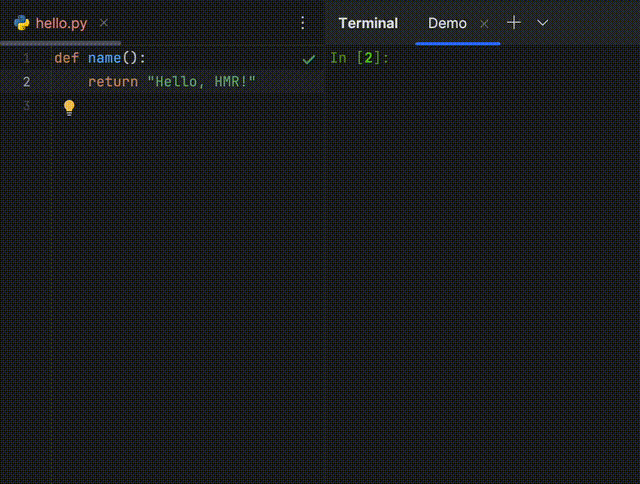Python Hot Module Reload

Better debugging experience with HMR




Automatic reload your project when files are modified.
No need to modify your source code. Works in any environment.

Supported Syntax:
- ✅
import X - ✅
from X import Y
Supported Types:
- ✅
Module - ✅
Function - ✅
Class
Installation
pip install python-hmr
Quick Start
[!CAUTION]
From v0.3.0, there is only one API, hmr.reload.
Import your dev packages as usual. And add 2 lines
for automatically reloading.
import dev
import hmr
dev = hmr.reload(dev)
If you have multiple modules to reload, you can do it like this.
from dev import run1, run2
import hmr
run1, run2 = hmr.reload(run1, run2)
Now you are ready to go! Try to modify the run1 or run2
and see the magic happen.
Detailed Usage
Function/Class instance
When you try to add HMR for a function or class, remember to
pass the name of the function or class instance without parenthesis.
from dev import Runner
import hmr
Runner = hmr.reload(Runner)
a = Runner()
b = Runner()
[!IMPORTANT]
Here, when both a and b will be updated after reloading. This may be helpful
if you have an expansive state store within the class instance.
However, it's suggested to reinitialize the class instance after reloading.
@Decorated Function
Use functools.wraps to preserve
signature of your function, or the function information will be replaced by the decorator itself.
import functools
def work(f):
@functools.wraps(f)
def args(*arg, **kwargs):
return f(*arg, **kwargs)
return args
Stateful application
If your application is stateful, you can exclude the state from being reloaded.
For simplicity, you can group all your state variable into the same .py file like state.py
and exclude that from being reloaded.
Make sure you know what you are doing.
This could lead to unexpected behavior and unreproducible bugs.
import dev
import hmr
dev = hmr.reload(dev, exclude=["dev.state"])
In this way dev/state.py will not be reloaded, the state will persist.
This also apply when reloading a function or class.
from dev import run
import hmr
run = hmr.reload(run, exclude=["dev.state"])
Acknowledgement
Inspired from the following package.








